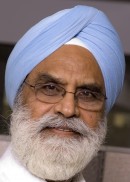Terror in Kabul should be a wakeup call everywhere
By Jasbir Singh Bhatia
Right now the world is focused on our life-and-death struggle against the coronavirus COVID-19.
We’re traumatized by the loss of human life. Joblessness is skyrocketing. Our economy may soon be in free fall. The whole world has nearly come to a standstill.
However, there’s another even stronger virus that keeps showing up to terrorize humanity. I’m speaking about religious and racial hatred. And too often it’s under-reported and elicits little more response than a shrug of indifference, especially when it happens elsewhere.
Multiple attacks on a Sikh gurdwara (temple) in Kabul, Afghanistan, in late March are among the latest tragedies. In this case, ISIS claimed responsibility.
When the shooting occurred, the congregation of about 80 people had assembled to pray for all humans as we battle COVID-19. Twenty-five worshippers were killed, including women and children. Many others were physically wounded. And all survivors will forever bear the emotional and psychological scars of the ordeal.
But the hatred didn’t stop with the shootings. While Sikhs were trying to perform cremation rites, they were attacked again.
Still not satisfied, the terrorists later bombed the gurdwara itself.
But the terrorists didn’t stop with bullets and bombs. Sikhs and Hindus were threatened: Either leave the country or be killed. It is simply ethnic cleansing.
The Sikhs and Hindus are original Afghan natives. Afghanistan’s Sikhs adopted the faith some 500 years ago, when Guru Nanak, the founder of Sikhism, visited that country.
At one time, there were more than half a million Afghan Sikhs and Hindus. When a few decades ago violence and terrorism began to be directed toward them, many fled the country. Many others died in repeated attacks.
Even during times of relative peace, Sikhs and Hindus are harassed and called “kafirs” (infidels).
Now fewer than one thousand are left, some of them orphaned children and widows. They have nowhere to go unless other countries grant them asylum.
The Afghan government hasn’t been able to ensure their safety. Last year a delegation of 18 Sikhs, who were traveling from Jalalabad to Kabul to meet with government officials, were gunned down on the way.
Afghanistan may be an extreme example of religious hatred, but hate crimes against individuals and attacks on houses of worship have happened in our country and elsewhere.
Attacks on a Sikh gurdwara in Wisconsin, an African-American church in Charleston, a mosque in New Zealand, a Jewish center in Pennsylvania are but a few of the many examples that have resulted in a tragic loss of innocent life.
What do the perpetrators hope to gain by such atrocities? Why do they not recognize that no one ever wins by acts of violence? Such acts merely generate more and more hatred and repressive actions.
Noble, divinely inspired personalities, which we may call them messiahs, prophets, gurus, sages and an array of other titles, have over the centuries been born in different parts of the world. They have preached about how to be better humans, how to grow to a higher level of consciousness, how to live a compassionate life and how to live in harmony with others and with nature.
However, instead of allowing such religious teachings to generate compassion and universal respect for all creation, religions have engaged in nearly constant competition for superiority and supremacy. Millions of people have died over the centuries in religion-based conflicts large and small. Worse still, too many have allowed hatred, not love, to guide.
I’m not sure just how much humanity has been benefitted by religion as it has been lived out. Tremendous damage and suffering has been caused by something that should have brought only peace and blessing.
Now that modern means of communication have created a global community, we desperately need to change religion’s emphasis. We need a different narrative about the true purpose of religion.
That’s the only way to create a world where all can live in peace and harmony. That would be God’s true kingdom. That would be heaven.
Jasbir Singh Bhatia, a past president of the Sikh Society of Central Florida, is a long-time member of the Executive Committee of the Interfaith Council of Central Florida.

